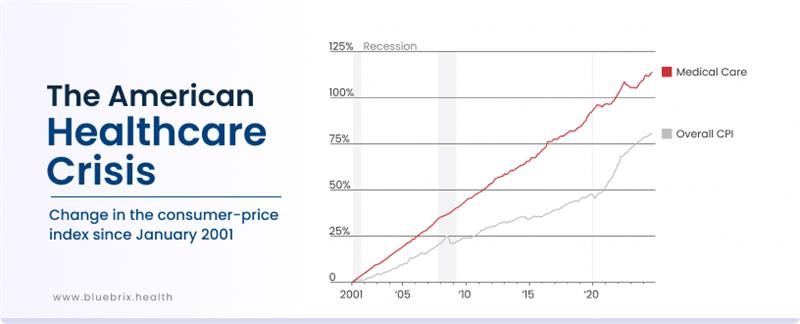News and media around the world are focused on Luigi Mangione and the United Healthcare CEO shooting; why are they failing to put the spotlight on the subject matter at the epicenter of this incident: the healthcare cost crisis?
America’s healthcare system is in trouble. You’ve heard it before, haven’t you? The headlines scream, the numbers shock, and yet here we are again. The Wall Street Journal recently laid it bare: healthcare spending is up 7.5% this year, reaching an eye-watering $4.867 trillion. That’s $14,570 for every man, woman, and child. It’s a staggering number, one that should stop us in our tracks. But does it? Or are we so used to the idea of spiraling costs that we just sigh and move on?
Here’s the thing: this isn’t sustainable. Hospital costs are soaring, chronic diseases are draining wallets, and individual Americans are buckling under the weight of ever-rising premiums and deductibles. We know the problems. We’ve seen the numbers. But what about the solutions?
There’s an idea worth paying attention to—value-based care (VBC). It’s a shift, a rethink, a move from paying for how much care you get, to paying for how good that care is. It’s not just a tweak to the system; it’s a philosophy, a new way of thinking about what healthcare should do and how it should do it.
Hospitals: the great drain
Let’s start with hospitals, those massive institutions we depend on but rarely think about until we’re wheeled into one. Spending on hospital care is rising at its fastest pace in over 30 years. Labor shortages, consolidations, inefficiencies—it’s all adding up. And who pays for that? You do. We all do.
Value-based care offers a way to change this. Imagine if hospitals were rewarded not for how many patients they churn through but for how many patients they help stay healthy and out of the hospital in the first place. Preventive care isn’t just a buzzword; it’s a game-changer.
Care coordination, for example, ensures patients don’t fall through the cracks after being discharged. No more unnecessary readmissions because someone forgot to schedule a follow-up. And then there’s the idea of hospital-at-home care, where patients receive acute care in their living rooms instead of in a hospital bed. It’s cheaper, it’s more comfortable, and—get this—it works.
The burden of chronic diseases
Then there are the chronic diseases—diabetes, obesity—the conditions that sneak up on you and stick around. The Journal points out that spending on medications for these diseases is climbing fast, and it’s no surprise. These are conditions that require daily management, often expensive management.
But what if we stopped focusing solely on treatment and started focusing on prevention? Value-based care does just that. Providers are incentivized to help patients manage their weight, their diets, their lives. It’s not just about prescribing insulin; it’s about helping someone never need it in the first place.
And let’s talk about drug pricing. In a value-based care system, pharmaceutical companies don’t just sell a drug and move on. Instead, the price is tied to results. If a medication doesn’t deliver better health outcomes, why should it command top dollar? It’s a radical idea, but it’s also a common-sense one.
The crushing cost to individuals
Finally, there’s the cost to you, the individual. Premiums are up. Deductibles are up. It feels like no matter how much you pay, you’re always paying more.
Value-based care has an answer here, too. By focusing on efficiency and quality, it can lower costs across the board. Bundled payments, for instance, offer predictability. Instead of paying for every little thing—an X-ray here, a blood test there—you pay a single fee for an entire course of treatment. It’s simpler, it’s clearer, and it saves money.
And then there’s the idea of shared savings. When providers save money by being more efficient, those savings can be passed on to you. It’s a system that rewards everyone, not just the biggest players.

